Showing 61-70 of 157 results
Cover Crop Field Tour Recap and Debrief
Attendees of the Cover Crops for Soil Health workshop have a short discussion reflecting on their tour of the long-term farming systems research project at the USDA Beltsville Agricultural Research Center in Maryland.
Farmer Panel on Cover Crops
Farmers Skip Paul (Rhode Island), Jeff Frey (Pennsylvania) and Perry Lilley (Maine) share their experiences with cover crops, including their motivation for using them, successes and challenges, factors that play into decision making around cover crops, and advice for ag service providers who want to encourage farmer adoption of this vital conservation practice.
Is Fish Waste Compost Worth the Mess and Effort?
A South Carolina farmer discusses the results of using fish waste compost in vegetable production.
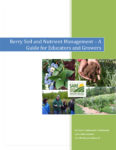
Berry Soil and Nutrient Management Guide for Educators and Growers
This manual has been designed as a comprehensive guide for educators and commercial berry growers interested in improving berry crop soil and nutrient management.
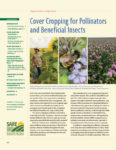
Cover Cropping for Pollinators and Beneficial Insects
This 16-page bulletin will help you use cover crops to encourage populations of pollinators and beneficial insects on your farm while you address your other resource concerns.
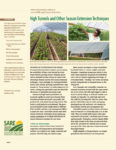
High Tunnels and Other Season Extension Techniques
From low covers to high tunnels, from hoop houses to greenhouses—producers are finding ever more innovative ways to extend the growing season, and their income stream.
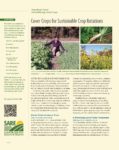
Cover Crops for Sustainable Crop Rotations
Cover crops are one of the best ways to improve soil health, reduce off-farm inputs and protect natural resources. Find a wealth of educational materials developed out of decades of SARE-funded cover crop research.
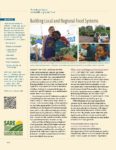
Farm to Table: Building Local and Regional Food Systems
More and more, farmers, ranchers, ag professionals, community organizers and others are striving to reconfigure the nation's food system so more value stays in food-producing communities.
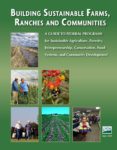
Building Sustainable Farms, Ranches and Communities
This guide lists funding opportunities offered by federal programs, and is indispensable for anyone seeking government help to foster their innovative enterprise in forestry and agriculture.
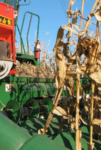
Cover Crops, Soil Health Principles and Maximizing Yields
Learn about basic soil health principles and how cover crops are key to making those happen on your farm.